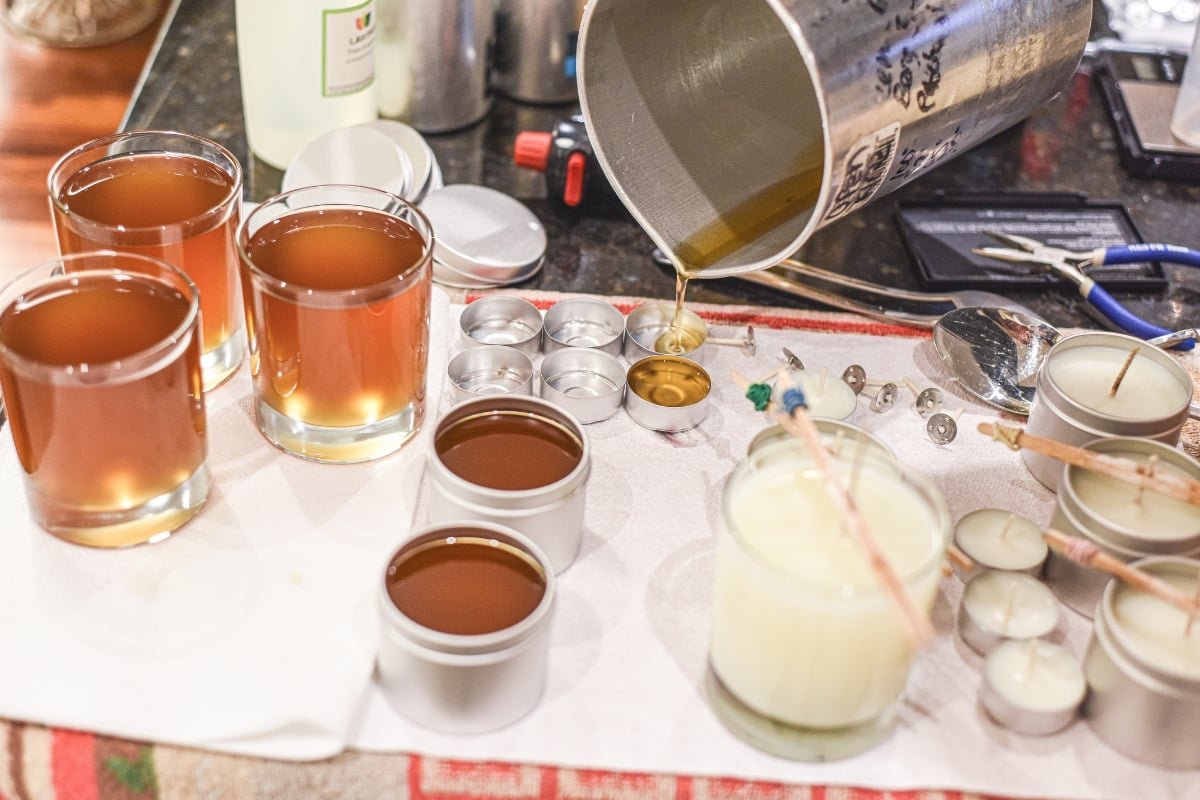Some of the links in this post may contain affiliate links for your convenience. As an Amazon associate I earn from qualifying purchases.
When natural disasters strike, having a reliable source of light for our families becomes a priority. While battery-powered flashlights and lanterns offer a safe option, what if you find yourself in a prolonged power outage situation? Developing the skill to make homemade emergency light sources, such as homemade candles and oil lamps, becomes invaluable. This knowledge is crucial for anyone facing the challenges of a grid down scenario caused by various natural disasters.

Candles
Candle are one of the most obvious sources of alternative light in power outages. A great time to go candle shopping is right after Christmas, when all sorts of holiday decorations are on clearance. You can pick up a bunch of candles for pennies on the dollar. In a survival situation, it really doesn’t matter if it is the middle of July and you’re breaking out the Santa candles, or April and enjoying Halloween colored ones. However, candles are very simple to craft.
Using Leftover Candles or Crayons
All those bits and bobs of old candles and crayons can be repurposed into an inexpensive (and potentially colorful) candle. Use an Altoids tin or another similar size metal container. Wicks can be purchased at any craft store or use simple cotton string.
Melt the wax in a clean soup can placed into a few inches of boiling water. Once melted, carefully pour the wax into the Altoids tin. As the wax begins to set, insert the wick. I usually do two or three wicks, placed evenly apart. This gives me the option of more or less light based on how many wicks I have burning.
Obviously, once lit, candles are an open flame and need to be treated with caution. Always be aware of what is near the candle and where it is positioned, lest you accidentally bump into it.
Warning! Use extreme caution with open flames. Make sure you have extra fire extinguishers or large boxes of baking soda on hand when using your homemade candles or lanterns.
Personally, I like to use oil lamps and candle lanterns for emergency light in the home during a power outage, as they tend to be a bit safer. But, there’s no arguing that candles can be a very cheap and reliable source of emergency light, as well as a great way to help get a fire going.
Pro Tip:
I usually do two or three wicks, placed evenly apart. This gives me the option of more or less light based on how many wicks I have burning.
Bacon Fat Candle
Personally, I’ve used a mini cast iron pot (a gift from my mom) to gather bacon fat. I inserted a wick from an inexpensive votive candle and the result is a bacon candle. To my pleasant surprise, it works! It doesn’t put off a lot of light, but it makes good use of items I already have on hand.
Using Conventional Candle-making Materials
This is the most basic type of candle to make. There are many other ideas and alternatives.
Supplies
The basics of candle making include these supplies:
- A dedicated pan. Your pan should be dedicated to melting wax only. Consider picking up an inexpensive one at a garage sale or thrift store. Some people also use double boilers to better control the heat as they melt their wax.
- Candle thermometer. A candle thermometer is used primarily for determining the wax temperature depending on the container you are using. If you are pouring it into a heat resistant jar you should not exceed 140 F. If you are using a metal container the temperature can be as high as 190 F.
- Heat resistant container
- Wax. Use any wax you please: paraffin, soy wax, bees wax, left over pieces of old candles and even old crayons can be used.
- Small paper clip
- Pencil
- Cotton string for a wick. The wick can be a simple cotton string.
Process
- Set your pan on medium heat.
- Begin heating the wax, a few pieces at a time. Once the wax heats to 140 F, it’s ready for your glass jar.
- Pour the hot wax to within half an inch of the lip of the jar.
- Tie your cotton string around the paper clip and submerge it into the wax centering the paper clip at the bottom.
- Dip the top portion of the string into the wax, pull it out and wrap it around the pencil. This will give you a coated wick.
- Allow the candle to cool for 12 hours or more. It’s then ready for use.
Lanterns
A simple oil lantern can be a quick and easy way to provide your family with light in a grid down situation.
DIY Mason Jar Oil Lanterns
The supplies are basic. All you will need is a Mason jar, wick, oil, hammer and nail.
Process


- Begin with punching a hole in the center of the lid with the hammer and nail.
- Insert the wick. As the wick burns, it will be consumed. Feel free to cut it extra long. The excess wick can accumulate at the bottom of the jar.
- Once the wick has soaked up the oil, it is ready to light.
- Make sure and only burn a small amount of wick at a time. If the flame is too big or begins to soot, the wick is too long.
- Trim it back.
With some planning and stockpiling you can provide your family with off grid lighting at a much lower cost than putting back expensive batteries.
DIY Olive Oil Lamp
This idea uses a different method to create the lamp. If you have a Mason jar, clothes hanger, cotton wick, and olive oil you can make an olive oil lamp. It’s a great way to use up old olive oil.
- Cut your plain metal hanger with wire cutters.
- Coil one end.
- Create an handle at the other end.
- Place the wick inside the coil and secure it with the last loop.
- Place a small amount of olive oil in the jar.
- Allow the oil to soak up the wick. Light and enjoy.
You can find more details and photos here.
Final Thought
Getting the hang of making your own emergency lights is like having a secret superpower for dealing with unexpected chaos. Ok, I’m exaggerating, but only a little. It’s not just about candles and oil lamps; it’s about feeling a bit more in control when things go haywire. And THAT is a good feeling.
Let me know what type of candles you are making!




